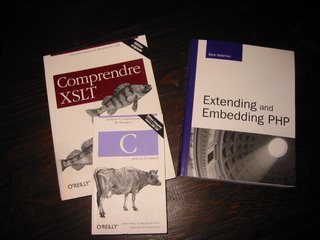 Hello !
Hello !
This is going to be my journal for the Google Summer of code 2006. I'll publish my work advances here.
You can find my proposal
here.
Sebastian Bergmann is my mentor and it's really a pleasure because he has both php and aop experience with projects like
PHPUnit and
aspectPHP. Moreover we get along very well.
The project is a new version of phpAspect written in C and using XSLT process to perform source code transformation:

Adopting this new approach will result in the following benefits. The lexical and syntax analysis will be independent of any PHP version. Existing XML tools like XSTL or XPath engine could be heavily reused to make the implementation significantly shorter and improve weaving performances.
Finally, it will introduce more flexibility in terms of the aspect language. For example, I could use the power of Xpath expression to introduce more logical operators in the aspect syntax. With this architecture, the compatibility with PHP 6 and features like namespaces will be very easy to implement.
If you have any question about the
phpAspect project for the SoC, just let me know:
wcandillon at gmail dot comor
phpaspect at googlegroups dot com




